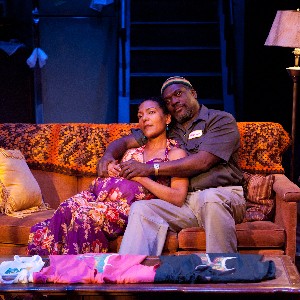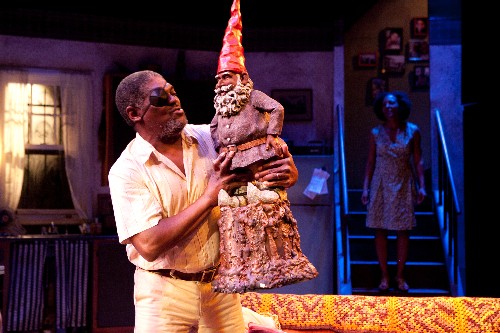Fuse Theater Review: Death Be Not Sappy
William King is a loving, self-sacrificing, salt-of-the-earth character mooning over the vanished past; Sonia is a saintly wife yearning for hubby to join her in Heaven; the sons care for each other and for their father—time to pull out your hankies.
Broke-ology by Nathan Louis Jackson. Directed by Benny Sato Ambush. Staged by the Lyric Stage Company of Boston, Boston, MA, through April 23.
By Bill Marx.

Those were the days: Patrice Jean-Baptiste (Sonia) and Johnny Lee Davenport (William) in BROKE-OLOGY. Photo by Mark S. Howard.
Granted, the American stage traditionally lags behind the times; theater companies are scrambling to catch up with multi-media as I write. And it is no surprise that critics at the New York Times and Boston Globe, their hearts and minds firmly in the nineteenth century, wept during Broke-ology—it is treacly, kitchen sink drama that could have been penned 100 years ago or longer. Still, it isn’t often you feel as if you have fallen into a time/space wormhole, theater slipping back into some sort of weepy second childhood.
The set-up is pure African-American Camille. We catch a rose-colored glimpse of William King and his wife Sonia before their two sons are born; they are an adoring couple living in a bad part of Kansas City, hoping to realize their dreams by moving into a better neighborhood. Flash forward to the present: William lives in the same beaten up home, has Muscular Dystrophy, and his beloved Sonia has been dead for over a decade. Unable to work, needing daily injections and pills for the pain, King approaches a diminished, late middle-age with admirable, stoic resilience, depending on daily help from his son Ennis, who works at a fast food restaurant and is reluctantly about to become a father.
So where’s the drama? Well, son Malcolm comes home from graduate school in Connecticut and wants to leave for good. He desires to live out Sonia’s dream of upward mobility. Ennis, realizing that he will need help nursing their father, demands that his brother stay. Malcolm, seeing that his father is declining physically and mentally, takes his time to make up his mind. William makes it crystal clear that he believes that Malcolm should fly the Kansas City coop. Occasionally, a nostalgic vision of Sonia appears to the befuddled William, evoking the perpetual wonder of their life together as well as the regrets that they never made good on their dreams, squelched by their having kids, racism, and limited opportunities.
That’s about it, in terms of conflict. Rookie playwright Nathan Louis Jackson resorts to all kinds of antique plot devices to drag the predictable, soap opera proceedings out, though ironically he gives the ending away via a dream William recounts early on. (This is the kind of script that, in order to make sure the audience understands what the dream means, explains it to us before the final fadeout.) The battle between the neatly contrasting brothers comes off as boilerplate sibling too-ing and fro-ing, more bottom line pragmatism than primal passion.
For some unaccountable reason (perhaps to keep the cast down to four performers), William has no friends, so Jackson uses a large, black garden gnome (think of Wilson the volleyball in the film Castaway) as a foil for William. Much depends on this gnome (which William names Chauncey), not only in terms of visual humor, but getting characters in and out of the kitchen—thus its weight conveniently shifts from scene to scene.

Me and my Garden Gnome: Johnny Lee Davenport (William), Chauncey, and Patrice Jean-Baptiste (Sonia) in BROKE-OLOGY. Photo by Mark S. Howard
William is a loving, self-sacrificing, salt-of-the-earth character mooning over the vanished past; Sonia is a saintly wife yearning for hubby to join her in Heaven; the sons care for each other and for their father—time to pull out your hankies. Jackson uses the streetwise Ennis to provide some laughs via pirate and N-word jokes before two tons of canned sentimentality fall on the show like a lead weight.
The Lyric Stage production, somewhat blandly directed by Benny Sato Ambush, centers on Johnny Lee Davenport’s solid performance as William. The talented actor presents a nuanced portrait of a proud man in pain, supplying some welcome flickers of anger and frustration when the subject of doctors comes up. But even he can’t overcome the saccharine writing, sugary cliches, and the interminable interludes in which we are just expected to feel sorry for William as he bumps around his living room and talks to the garden gnome. Eventually, Davenport comes off as calculating rather than heart-breaking, his technique fuel for powering a rusty dramatic contraption rather than generating a portrait of a character who is writhing at the end of his tether.
Because the dramatic focus is on Davenport, the other performers are pushed well into the background. Patrice Jean-Baptiste perseveres in the thankless role of Sonia, a flickering spirit of niceness from the netherworld of William’s mind. Monty Cole (Malcolm) and David Curtis (Ennis) contribute polite, one-note turns as the brothers. Nothing seems at stake in their squabbling because everything follows a well-worn melodramatic formula—Broke-ology is another installment in a tedious theatrical line of long, long teary goodbyes.
